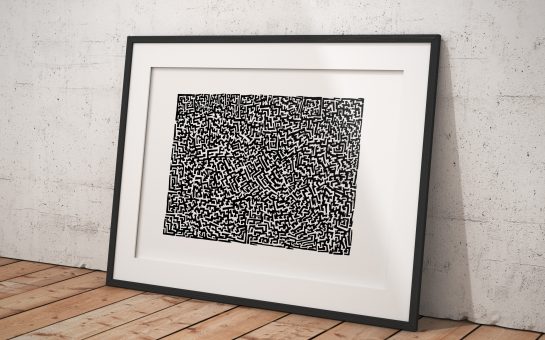
The play, based on immigration, is at Theatre 503 until April 26.
Scare mongering headlines, empathetic television reports, the ‘Go Home’ wagons.
Immigration is a hot topic that no Briton can escape. Since the Romans, through the Vikings and the renaissance merchants, imperialism and the Maastricht Treaty, Britain has welcomed and prospered from a relatively open migration policy.
Yet the debate over the health of a nation that so freely accepts newcomers remains hotly contested.
Last week alone, the Daily Mail and Daily Express ran with front-page stories of migrants clinging on trucks to board the Calais ferry crossing. PM Nick Clegg and UKIP leader Nigel Farage were embroiled in their TV debate on border controls. Meanwhile, campaign group MigrationWatch UK predicts 500,000 newcomers may arrive in the UK by 2019.
Immigration is something we simply cannot avoid discussing, which is why Theatre 503’s production of Occupied is likely to attract plenty of packed houses over the coming month.
Occupied directly addresses the issues of UK immigration but not in the way you expect. Gone are the Clegg/Farage style opposing camps – one fighting their cause while the other argues back. No, what playwright Carla Grauls has done is pitch supposed clear-line issues into an entangled mess of struggle and self-reflection.
Identity doesn’t exist in Occupied, characters are projected and then picked apart, with the overriding theme of loneliness, loss and frustration penetrating the core of each on stage.
We open with Tom, bound and gagged, while Romanian Andreea plays the harpsichord and compatriot Alex, our mock hero, squats on the toilet. It’s filthy, cold, squalid and only in parts does this performance exhibit the warmth migrants no doubt hope is available across the Channel.

The concept of two Romanians kidnapping an Englishman is at first quite alarming, and when Alex, played by Mark Conway, is in full drunken rage mode there is genuine petrification in the audience.
However, for the most part this production exists to juggle ideas, to challenge concepts and to cheat at cards – not progress a plot.
So what works and what doesn’t? The premise is that Alex is determined to become English. He rescued Andreea from a London brothel only to send her onto the streets at night, drinks obsessively and has bad teeth. He is living in the idyllic world, where “there is a pub on every street and there are naked women in your newspaper. UK is the land of opportunity.”
But his dreams are quashed by an inability to adapt, an otherness that attracts unwanted attention and a gross misunderstanding of his own limitations. In essence, Alex is the embodiment of post-revolution Romania, as Carla, who lived in the country in 2006, explains.
“There was a sense of all those hopes and everything after the revolution not coming to the fore and also how people saw the UK as a bit of a land of opportunity.
It was really positive. There was no idea of ‘oh, we want to go to the UK for benefits’.”
While Conway’s tub-thumping performance will steal Theatre 503’s audiences, it is Andreea’s situation that is most striking and one we see on the streets of London. We are never told her real age, but the hostage Tom goads her until we suspect no older than 13. Exceptionally played by Josie Dunn, Andreea’s state is a sorry one; desperately saving up money in a wooden box under the public sink, brushing her teeth with her finger.
There is always a sense with Andreea that she is no Eliza Doolittle waiting for a dashing Henry Higgins to sweep her off her feet. Tom’s money and position as a working Englishman is dismissed as fruitless to the Romanians’ cause, they need more than a helping hand from a pitting native.
As for Tom – bandaged, sweaty and scared – we feel very little affection. It is almost as though the one character the majority of the audience should adhere to is actually the most alien.
Tom, played by Joe Marsh, shouts, screams, flirts and finally confesses to his own misgivings, yet his character evokes only minute interest compared to the unknown volatility of Alex and Andreea’s secret life.
Overseeing the performance is Fiz Marcus’ portrayal of Elena. Prepare to be utterly petrified by the dishevelled old lady eating paper, sleeping in the corner and singing songs of the old country.
While Carla insists this is a character play, it often struggles to push the plot forward with the sort of rhythm you crave. Party scenes of singing and dancing are fun and break up the script, but are usually followed by scenes of aggression – instigated on the whole by Alex.
The very mild suspected romance between Tom and Andreea is hard to grasp considering both characters’ situations – and it remains an unnecessary device to bond the pair together, when simple friendship would do the job.
Make no mistake, the production is funny in parts and certainly presents a unique insight into a miserable life few of us can consider. Yet as the lights fade we’re left hollow and without assurance any of these problems will be resolved, a point Carla herself was keen to stress.
“We are trying to tackle the negative image and really confront the clichés and stereotypes, on both sides, of Romanians and of Britons.
“People are always trying to find their way home in another place.”
Follow us @SW_Londoner




